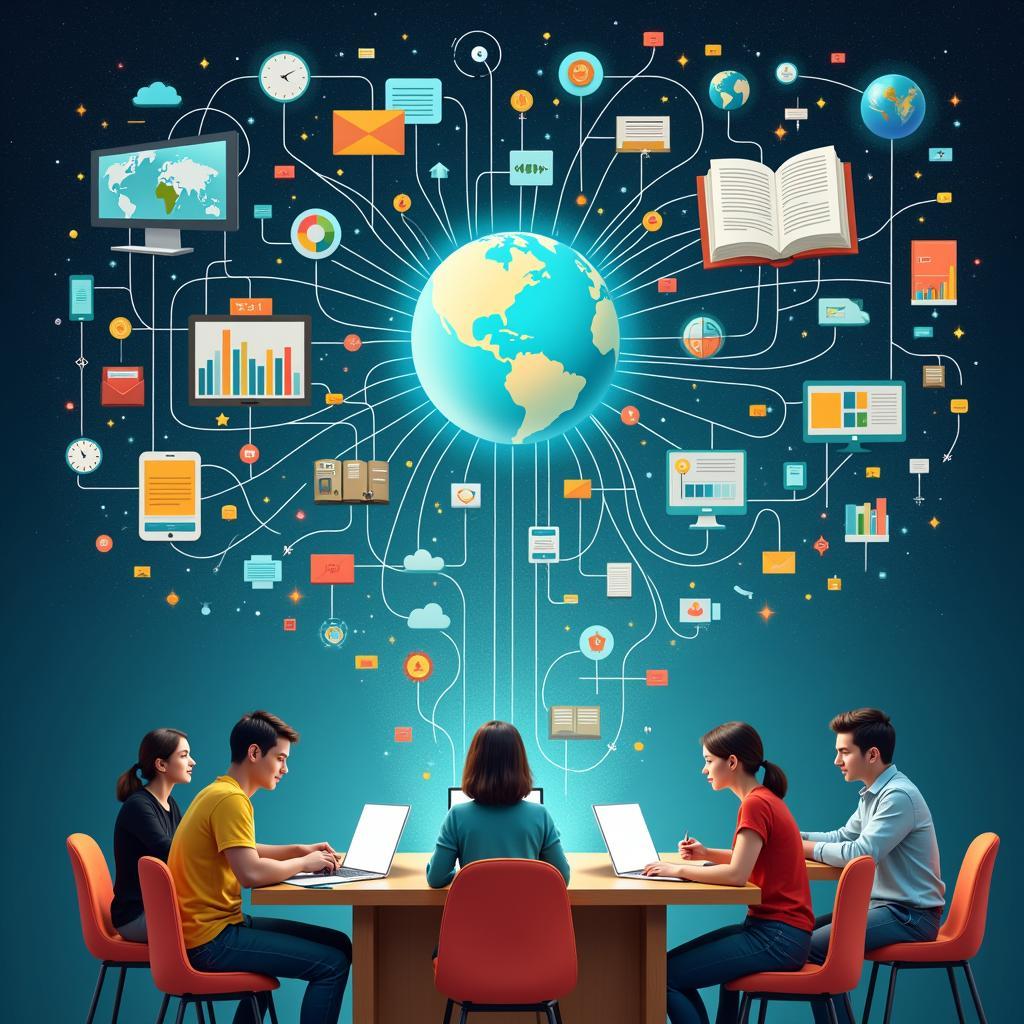Books, technology, and society are in a constant dance of influence and evolution. From the invention of the printing press to the rise of ebooks, technology has dramatically shaped how we create, consume, and interact with books. This, in turn, has profound implications for society, impacting everything from literacy rates and education to cultural values and social structures.
How Technology Transforms the World of Books
The relationship between books and technology isn’t new. The development of writing itself was a technological advancement, enabling humans to record and transmit knowledge across generations. The printing press, for example, democratized access to information, fueling social and political revolutions. Today, digital technologies like ebooks, audiobooks, and online libraries are further transforming the book landscape. Ebooks offer portability and convenience, while audiobooks cater to diverse learning styles and those with visual impairments. Online platforms provide vast repositories of knowledge, connecting readers worldwide. This digital revolution has spurred new forms of literary expression, such as interactive narratives and fan fiction, fostering creativity and community engagement. Shortly after the initial invention of the printing press, societies saw a marked increase in literacy. Today, similar societal shifts are occurring as a result of the digitization of books. Check out our resources on the Jewish Publication Society.
What are the societal implications of these technological advancements in the book world? Increased access to information empowers individuals, fostering critical thinking and informed decision-making. The ability to connect with diverse voices and perspectives promotes empathy and cross-cultural understanding, crucial ingredients for peacebuilding. Digital platforms facilitate collaborative learning and knowledge sharing, driving innovation and progress. However, the digital divide, concerns about intellectual property, and the potential for misinformation pose challenges that need to be addressed to ensure equitable access and responsible use of technology.
The Future of Books in a Digital Age
What does the future hold for books, technology, and society? While the format and delivery mechanisms may continue to evolve, the fundamental role of books as repositories of knowledge, sources of inspiration, and vehicles for cultural expression will likely endure. Emerging technologies such as virtual and augmented reality offer exciting possibilities for immersive reading experiences. Artificial intelligence could personalize learning and enhance accessibility, tailoring content to individual needs. Learn more about how stories shape society on our page about those who tell the stories rule society.
How can technology empower societies through books? By leveraging technology responsibly, we can bridge the digital divide and ensure equitable access to information and education. Fostering digital literacy and critical thinking skills is crucial for navigating the complex information landscape. Supporting independent authors and diverse voices ensures a vibrant and inclusive literary ecosystem. Promoting cross-cultural dialogue through literature can build bridges of understanding and foster a more peaceful world.
Navigating the Challenges and Opportunities
As with any technological advancement, the intersection of books, technology, and society presents both challenges and opportunities. Combating misinformation and promoting media literacy are essential for ensuring a healthy information ecosystem. Addressing copyright concerns and supporting authors in the digital age requires innovative solutions and collaborative efforts. Explore insightful quotes about societal impact on our Fahrenheit 451 society quotes page.
How can we build a more equitable and peaceful future through books and technology? By fostering a culture of lifelong learning and critical thinking, we empower individuals to navigate the complex information landscape and contribute meaningfully to society. Promoting cross-cultural understanding and empathy through literature can break down barriers and foster a more peaceful world. Embracing innovation while upholding ethical principles ensures that technology serves humanity, not the other way around. The Society of Women Engineers Scholarship program demonstrates the power of supporting individuals in pursuing knowledge and making positive contributions to society.
 The Future of Books, Technology, and Society
The Future of Books, Technology, and Society
In conclusion, books, technology, and society are inextricably linked, influencing each other in profound ways. By harnessing the power of technology responsibly, we can empower individuals, foster peace, and build a more just and equitable future for all.
FAQ:
- How have ebooks impacted the publishing industry?
- What are the benefits of audiobooks for different learning styles?
- How can technology be used to promote literacy in developing countries?
- What are the ethical considerations surrounding the use of AI in book publishing?
- How can we combat the spread of misinformation online?
- What are the long-term implications of the digital divide on access to literature?
- How can we ensure that technology enhances, rather than diminishes, the value of books?
For further information about American music and its role in society, visit our page on the Society for American Music.
Need further assistance? Please contact us at Phone Number: 02043854663, Email: [email protected] or visit our address: Zone 34, Bac Giang, 260000, Vietnam. We have a 24/7 customer service team available to assist you.